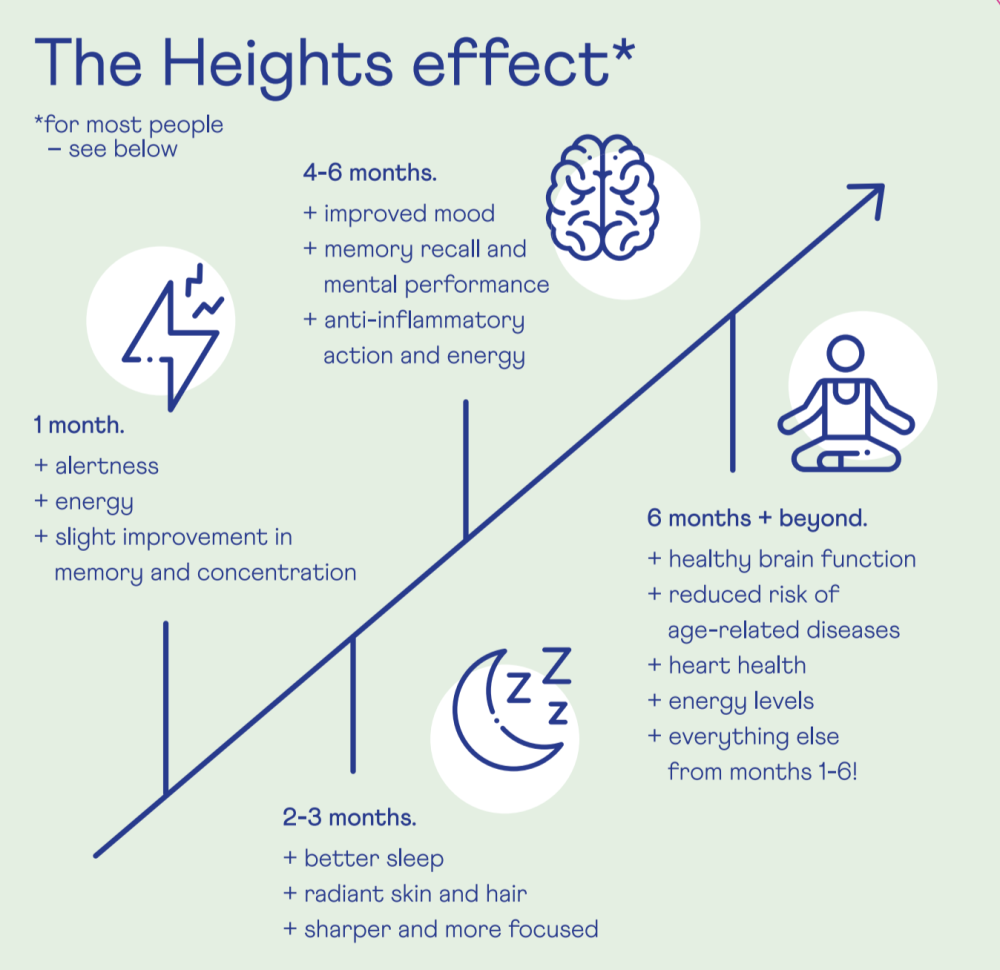Taking Vitals⁺? Here’s what you can expect
When will your new nutrients start to get to work? And what, if anything, will you feel when they do?


Brain health isn’t a destination, it’s a journey
When you start taking the Vitals⁺, or any new supplement—it’s totally normal to look for changes and improved brain health straight away. Some people do report feeling changes and improvements within the first few weeks, but if that’s not the case for you, don’t worry. Nutrients work at different rates, for different people—so, if after a few months you just feel normal, that’s a good thing! Feeling ‘normal’ might not seem that exciting or something you generally aspire to, but when it comes to your health—normal means you’re winning.
Where’s your starting point?
Everyone’s unique and depending on your nutrition levels at the start, it might take weeks or months of supplementing before you experience any impact. Experts recommend supplementing for at least three months for the nutrients to absorb, and for any deficits to start to be replenished.
To get a good understanding, we’ve worked with experts in neuroscience and nutrition to develop an assessment to see how your nutrition is affecting your brain. We suggest taking it before you start taking Heights, and then again at three-month intervals so you can track your progress.
Take the Brain Nutrition Assessment to find out how well-nourished your brain is.
When will you feel a difference?
Everybody’s biochemistry is unique, so the length of time for reaping the benefits of your supplements will differ—for example, our vitamin deficiency study showed that 70% of people were deficient or borderline deficient in thiamine, and 88% were deficient in riboflavin. Deficiencies like these take a longer period of time to replenish, so it takes longer for them to start to work, and for you to feel a difference.
Every nutrient absorbs at different rates
The other major factor to consider when you’re thinking about feeling the effects of supplements is solubility. In order for them to get to work, the nutrients have to dissolve to pass through the lining of the intestinal tract into the blood. The blood then carries these nutrients to the sites where they will be used by the body.
Some nutrients are fat-soluble and any excess amounts are accumulated and stored in the body, whereas water-soluble nutrients cannot be stored, and anything the body doesn’t use is excreted. Water-soluble nutrients (such as B-vitamins and vitamin C) dissolve in water—meaning they will absorb much faster into your tissues. Fat-soluble vitamins (vitamin D, E, A, and K) need to be taken with a fat to be absorbed—luckily, Vitals⁺ is in a clever capsule to make that happen—and take a lot longer to yield results.

A breakdown of the Heights timeline (above).
The benefits timeline
The first 3 months
more energy
improved memory and concentration
better sleep
radiant skin and hair
bolstered immunity
During the first few months of taking Vitals⁺, there’s a lot of action happening behind the scenes (in your body), that you may or may not notice. Thanks to the B vitamins, your energy metabolism will start to improve, and levels of other essential nutrients will be replenished—meaning you may feel more alert and energetic. As anthocyanins start to kick in, your memory and concentration may also start to improve—so it’s the perfect time to start new habits (like journalling, exercising, and taking your Heights 😉).
The nutrients that help your brain health, in turn, help the rest of your body—which is why you might notice improvements there, too. Towards the end of the first three months, many people also report that they are sleeping better, as well as noticing more radiant skin, and strong, shinier hair and nails. Your immune system will be bolstered too as your body starts to absorb vitamin C, D, and zinc.
Months 3-6
stabilising mood
memory improvements
better cognitive function
more energetic
fewer bouts of illness
improved exercise performance
Improvements in your mood may occur as your levels of omega 3 DHA rise. And, if you had mild memory problems previously, you may notice some improvements there, too. You might also notice an uptick in your cognitive function, focus, and mental performance—pay attention to how you feel during your workday, how your decision-making is, or if you’re nailing the Sunday crossword.
Your improved iron levels will mean you’ve got more energy, and you may notice that you’re getting ill less often, or for shorter lengths of time as your immune system is reliably getting everything it needs to work at its best.
Your body is also fighting off oxidative stress, as antioxidants (from vitamin D, E, A) are absorbed and fight inflammation. This is important because oxidative stress damages your DNA and cells, contributes to ageing, and is linked to all types of diseases such as cancer, Alzheimer's, and diabetes.
You might also find that your performance in exercise improves, as your body has additional B vitamins to support energy production and recovery.
Read more about which nutrients support your immune system
Month 6-onward
long-term health for brain and body
reduced risk of cognitive decline
restorative, regenerative sleep
improved stress response
healthy heart function
lower risk of disease
Investing in your nutrition long-term means you will continually enjoy all the benefits from the first six months—resulting in feeling well in your brain, body, and mind as standard.
Optimising your nutrition maintains healthy brain function throughout your life, protecting the structure of your brain from age-related changes. It also may help to reduce the risk of age-related cognitive diseases such as Alzheimer’s and dementia—one study (1) found that DHA supplementation resulted in a 47% decrease in the risk of developing Alzheimer’s.
(Did you know that cognitive decline can begin in your 30s? 😱 So, the way we treat our brains today—has a direct impact on the health of our brains in 10, 20, 30, or 40 years to come.)
The Vitals⁺ fights free radicals, which combat oxidative stress (which causes cell death and accelerates ageing), and reduces inflammation which leads to disease throughout the body. And, taking nutrients—such as zinc, omega 3, and B vitamins—to support sound, restorative sleep and improve your stress responses can reduce the risk of long-term illnesses such as diabetes and heart disease.
Omega 3 EPA and DHA, in particular, contribute to normal function of the heart. You may experience reduced levels of the bad cholesterol (LDL), which reduces your risk factors for cardiovascular disease, and even certain cancers with long-term use of anthocyanins and DHA.
Take a deep dive into our ingredients
If you have more questions on Vitals⁺, try our FAQs.